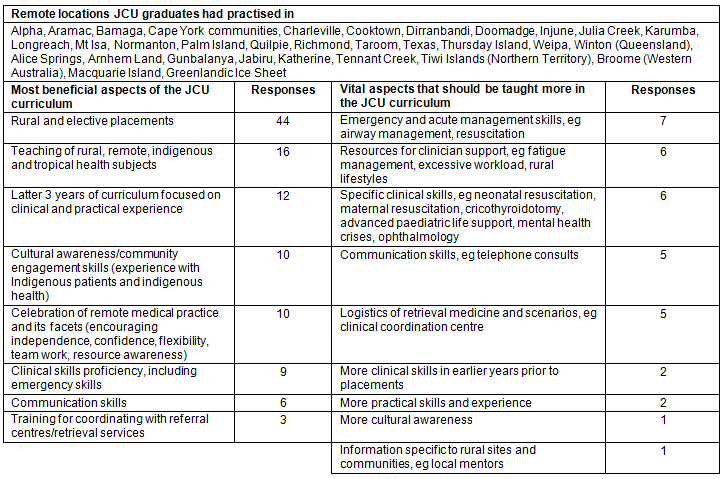Dear Editor
The James Cook University's (JCU) MBBS program was designed to address the workforce needs of underserved populations in rural and remote northern Australia1. As part of our annual evaluation process, the JCU medical school recently surveyed former graduates about their preparedness for remote practice.
A total of 338 JCU medical graduates who had been in the workforce for 4-8 years were contacted via telephone and email; 184 (55%) responded. Graduates were asked whether they had practised at least one rotation (10 weeks) in a remote town. Town locations were then classified according to Australian Standard Geographical Classification - Remoteness Area (RA) categories2, and considered remote if RA scores were ≥4. Since graduation, 48 (26% of respondents) had practised in a remote setting. Graduates were also asked how well the JCU medical curriculum prepared them for remote practice, with 47% and 42% of respondents, respectively, stating that the JCU medical school prepared them well or very well. While these data are primarily a self-report of confidence, having 90% of JCU medical graduates saying they were well prepared for remote practice suggests our curriculum and assessment practices align well for encouraging careers in rural and regional areas, as designed3.
In addition, other medical academics may be interested in the findings of a content analysis on the open-ended questions: 'Which aspects of the JCU course were most beneficial for remote practice?' and 'Were there any vital aspects of remote practice that you had to learn on the job that should be taught in the course?' Responses were coded into categories and analysed for frequency to build up inferences4.
Findings (Table 1) suggest JCU's emphasis on rural, remote, indigenous and tropical medicine, placements in rural or remote localities, and skills appropriate for independent practice were the main reasons why nearly all our graduates felt well prepared for remote environments. Indeed, as 26% of respondents had practised in RA 4-5 within 4-8 years of graduation, JCU medical graduates appear to be making significant workforce impacts in noted underserved areas early in their careers5. However, preparation could be enhanced by teaching additional skills in emergency and acute management, retrieval and telemedicine.
Table 1: Aspects of the James Cook University (JCU) medical curriculum that 48 JCU medical graduates who had spent at least 10 weeks in a remote location (Australian Standard Geographical Classification - Remoteness Area 4 or 5) considered 'most beneficial for preparation' and 'should be taught more'

Anubhav Chopra, MBBS
James Cook University School of Medicine & Dentistry
Townsville, Queensland, Australia
References
1. Sen Gupta T, Woolley T, Murray R, Hays R, McCloskey T. Positive impacts on rural and regional workforce from the first seven cohorts of James Cook University medical graduates. Rural and Remote Health 14: 2657. (Online) 2014. Available: www.rrh.org.au (Accessed 1 May 2014).
2. Australian Government, Department of Health, Doctor Connect ASGC Remoteness area 2006. Available: www.doctorconnect.gov.au/internet/otd/publishing.nsf/Content/locator (Accessed 5 April 2014).
3. Hays RB. A new medical school for regional Australia. Medical Journal of Australia 2000; 172(8): 362-363.
4. Weber RP (1990). Basic content analysis. 2nd edn. Newbury Park, CA: Sage. p. 12.
5. Harding J. General practice medical workforce in Australia: what the data say. In: Proceedings, AMA Annual Conference, 1999.
